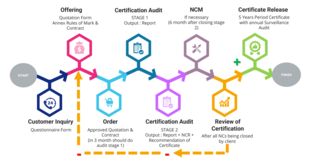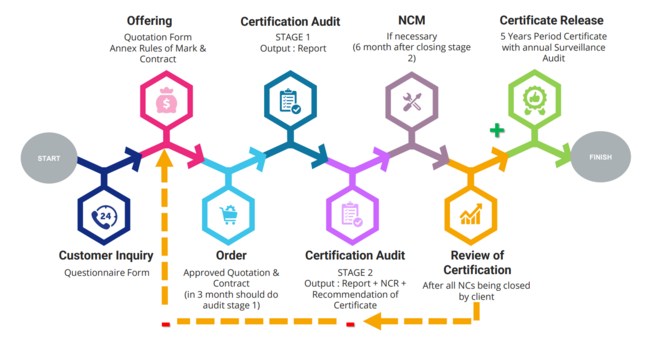Indonesia Sustainable Palm Oil
The Indonesian Sustainable Palm Oil (ISPO) certification is a comprehensive assessment system for oil palm plantations and processing activities. It provides a written guarantee that the products and management practices meet ISPO principles and criteria, which include:
• Economic viability
• Social and cultural responsibility
• Environmental sustainability
ISPO ensures compliance with Indonesian laws and regulations, promoting sustainable practices in the palm oil industry.
Objective of ISPO Implementation
• Ensures compliance to national laws and standards, reinforcing the company’s commitment to legal and sustainable practices.
• Encourages effective management of oil palm plantations through compliance assessments, addressing environmental and social concerns.
• Increases the marketability of certified products and supports the long-term sustainability of the palm oil business.
ISPO Certification Process




Audit Process
- Initial Certification Audit : Audit Stage 1 & Audit Stage 2
Stage 1 | Stage 2 |
Assessment includes:
| Assessment includes:
|
|
|
Certificate Issuance | |
| |
- Surveillance Audits (SA): SA-1 to SA-4:
- Surveillance 1 conducted between 9 – 12 months after the certification decision.
- Subsequent surveillance audits must be conducted no later than 1 year from the previous surveillance.
- If there are non-conformities, a 3-month period for improvement will be given. Decision on surveillance results: maintenance, suspension, or revocation of ISPO certificate.
- In case of a suspension decision, a period for improvement will be given before the revocation of the ISPO certificate.
- Recertification: 1 cycle period of 5 years
- Recertification is completed at the end of 1 cycle of ISPO certificate period, earliest submission for recertification is 6 months.
- Recertification audit is conducted in accordance with the initial certification.
- If there are no significant changes affecting ISPO principles & criteria, the recertification audit can proceed directly to Stage 2.
Requirements for ISPO
PALM PLANTATION COMPANY
- Plantation business license
- Proof of land ownership rights
- Environmental permit
- Designation of plantation class from the plantation business license issuer (Class I, Class II, or Class III)
- Internal auditor
PLANTATION
- Certificate of plantation business registration
- Proof of land ownership rights
- Environmental Management Statement (SPPL - Surat Pernyataan Pengelolaan Lingkungan)
- Internal Control Team
Contact Us
Tel.: +62 8211 586 3355
sustainability_sales@tuv-nord.com